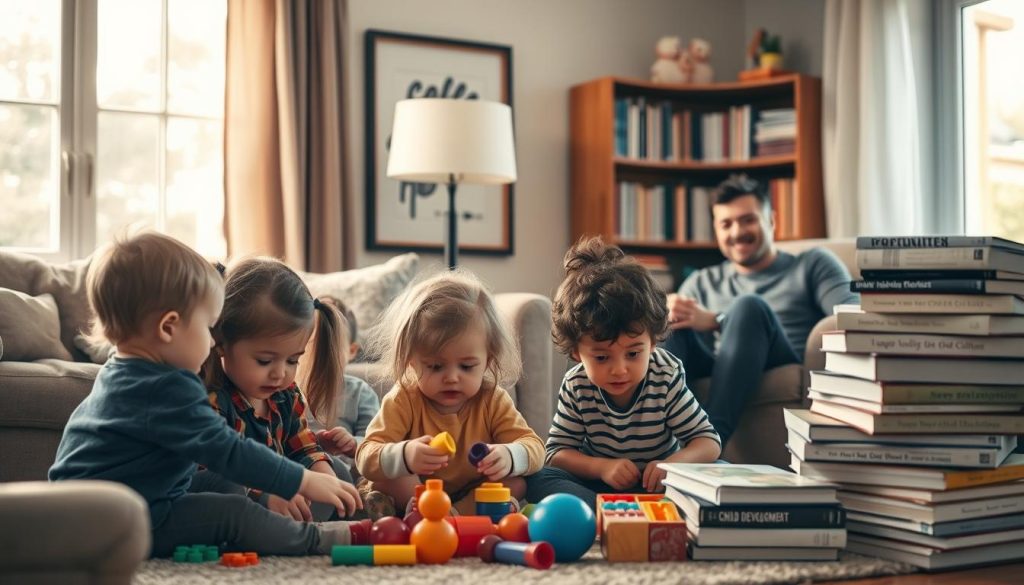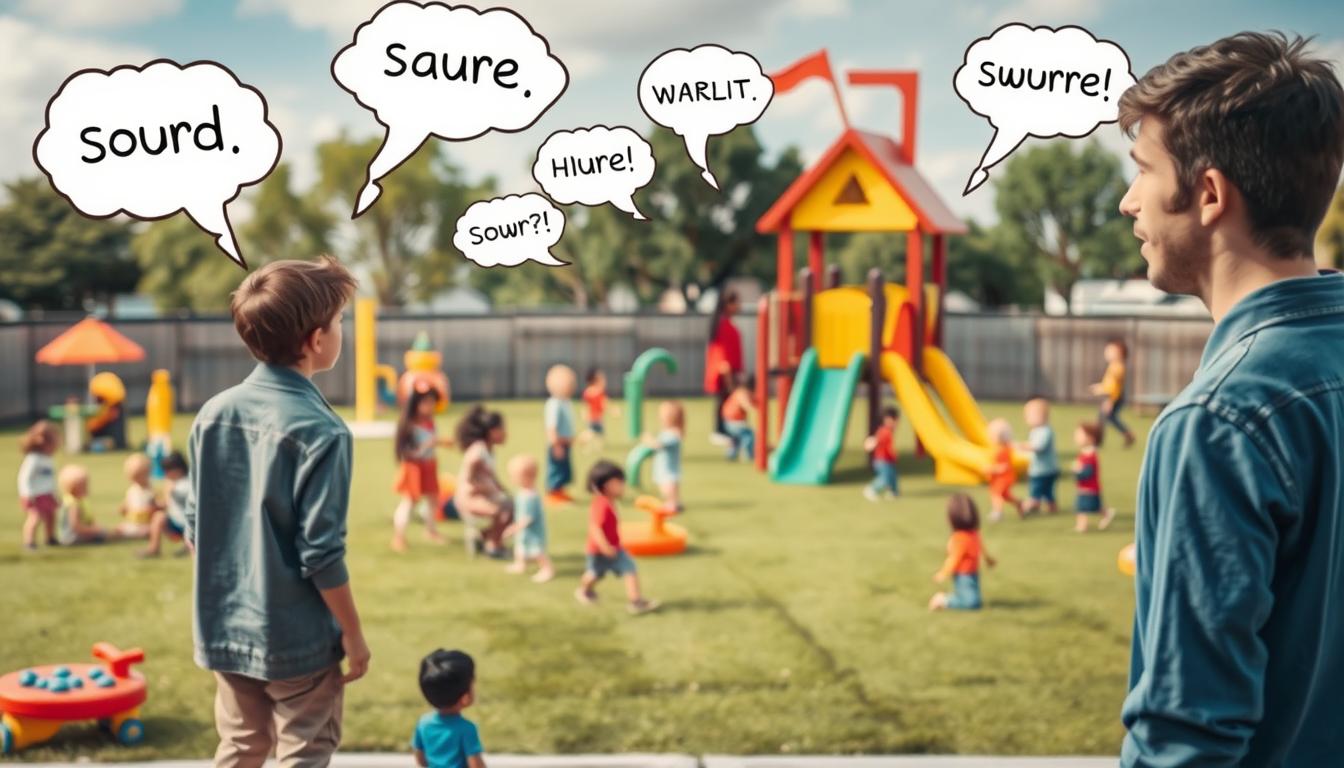Has your child ever surprised you with a question about swear words? This can be really uncomfortable. It also makes you think about how much they know about such language. How do you talk about this without making it seem bad or interesting?
When dealing with these moments, staying calm and clear is key. Kids are naturally curious and might hear swear words at school or with friends. Using Montessori parenting values like kindness and understanding can really help. But, where do you begin? How do you explain swear words in a way that teaches kids about consent and other sensitive topics?
Key Takeaways
- Understanding the inevitability of children encountering swear words.
- Montessori parenting focuses on teaching grace, courtesy, and empathy.
- Effective conversation about swear words includes defining their rudeness and offering alternatives.
- Staying calm and curious about children’s understanding of swear words is crucial.
- Use this opportunity to instill social skills for respectful interactions.
Understanding Why Kids Use Swear Words
It’s key to know why kids might swear. This knowledge helps promote good behavior. Kids often swear to show strong feelings like pain, frustration, or anger. They might do this when they mimic adults or try to fit in with their peers.
A change in language norms since 2016 has also made kids more likely to use profanity.

Common Triggers for Swearing
Many things can make kids swear, like feeling upset or trying to get a reaction from adults. They might swear when they’re in pain, upset, or frustrated. The last few years have made swearing more common, especially with kids hearing it at home and in media.
Influence of Social Circles
Kids swear to fit in or stand out. They might do this to be funny or shocking, or to imitate their friends. The rise in kids’ screen time and social media use also plays a big role. They learn from what they see and hear online.
Impact of Media and Public Discourse
Media and public talk shape what kids say. They might copy what they hear on TV, in movies, or from famous people. Talking about how media uses strong language can help kids understand.
Parents can also discuss different ways to talk about politics and swearing. This helps kids learn when it’s okay to use certain words. Seeing how leaders speak can also guide parents in teaching kids about language.
Good parenting includes setting rules for respectful talk and being consistent. Limiting screen time and social media can help reduce swearing. Teaching kids to express feelings in other ways is also key.
Initial Reactions: Staying Calm and Composed
When kids start using swear words, how you react matters a lot. It’s key to stay calm to avoid making the behavior worse. Being consistent in parenting helps shape their brains and expectations.
Taking a calm approach helps avoid unnecessary conflicts with siblings or step-siblings. This way, you keep family relationships strong.

Gaining Insight into Their Curiosity
Figuring out why your child is curious about swear words can be enlightening. They might be testing limits or copying what they see. A stable, calm space encourages their curiosity and learning.
Knowing why they use swear words helps you tackle the issue at its source. It could be stress from family budgeting or something they see at home.
Responding Without Overreacting
Instead of getting angry, talk to them with understanding. This way, you teach them right from wrong in a gentle manner. Being consistent helps kids feel emotionally stable and in control.
By staying calm, you build trust and make your child feel safe and supported. This is crucial for their emotional well-being.
Explaining the Impact of Swear Words
By the time kids start school, they often know 30-40 offensive words. It’s important to explain the impact of swear words. Your child needs to know how swearing affects others.
Swearing can start as early as age two. By age 11 to 12, it sounds more adult-like. So, it’s key to start teaching early.

Communicating the Social Consequences
Kids who swear might not realize how it hurts others. TikTok has challenges that encourage kids to swear. For example, the “Cursing Challenge” and the “Bad Word Bathroom Challenge” are popular.
Teaching kids about the social fallout of swearing can be a wake-up call. It can damage relationships and offend people. This is something they need to understand.
It’s not just parents who influence kids to swear. Social media plays a big role too. Ignoring swearing behavior helps reduce it. Setting clear rules in the home is also crucial.
Teaching Empathy and Respect
Understanding social consequences is just part of the story. Teaching empathy and respect is also key. Childhood eating disorders and postpartum mental health issues can be made worse by swearing.
Teaching kids to think about others’ feelings is important. This helps them to speak more mindfully. Emotional conversations, like those about divorce, can get worse with swearing.
Encourage respectful dialogue in kids. Parents should be role models and use fewer swear words. This promotes respect and healthy relationships.
Alternatives and Better Ways to Express Emotions
Teaching kids to express emotions in a healthy way is key. Online family therapy can be a big help. It guides them to communicate better and feel good about themselves.
Offering Acceptable Words and Phrases
Teaching kids the right words for their feelings is crucial. It keeps them from using bad language or acting out. You can make charts with different feelings and words to match.
These charts are great for kids and parents. They’re especially useful during online family therapy sessions.
Using Creativity to Make Teaching Fun
Make learning fun with creative activities. Role-playing or using funny words instead of bad ones is a great way. It turns a bad moment into a chance to learn.
Talking about characters in books or movies can also help. It shows kids how others handle feelings.

Encouraging Emotional Intelligence
Emotional intelligence is vital for kids. It helps them understand and manage their feelings. By talking openly about emotions, kids become more resilient.
It also helps them get along better with others. Online family therapy can help kids build these skills.
Learning about emotions early on helps kids with anxiety and boosts their self-esteem. When kids know how to handle their feelings, they feel more confident. This helps them in many areas of life.
Parenting Challenges: Setting Boundaries and Consistency
Setting boundaries and being consistent are key for parents, especially when it comes to swearing. Parents often say “no” from birth to age 18. This needs constant effort and agreement among caregivers to set clear rules.
The Nurturing Parenting Community Based Education Program stresses consistent rules for parents and kids. Being consistent helps teach important values like honesty and respect, especially in teens. Studies show that mixed parenting can confuse kids and cause problems.
Teenagers need clear rules to handle adolescence well. Mixed rules can cause stress and bad feelings like anxiety. Parents should agree on rules for the whole family. The Search Institute’s 40 Developmental Assets help parents understand child development and set better rules.
Positive reinforcement works better than punishment to change behavior. For example, a positive reinforcement schedule is very effective. It’s great for teaching kids to recycle and conserve.
Parents often block their kids’ desires, so setting limits is crucial. It’s not just about saying “no.” It’s about teaching kids through sports and dealing with middle child syndrome. By making exceptions sometimes, parents can teach kids about rules without letting them test them too much. But, being too flexible can lead to more testing.
In short, wise parents set limits to teach kids right behavior. Clear and consistent rules help build a strong parent-child bond. This prepares kids for adulthood. Setting clear rules and being consistent is hard, but it’s the best way to raise well-rounded kids.
Role-Playing and Teaching Social Skills
Role-playing is a great way to teach kids how to interact well and handle social situations. By acting out scenarios, you can teach them to use polite language. This is very helpful when there are new family members, like in remarriage and children.
Scenarios for Effective Communication
Setting up specific scenarios for role-playing can really help your child talk better. For example, you can practice talking about tough topics like drugs. This helps them feel more confident and prepared.
It’s also good to let your child practice being in charge. This helps them learn how to handle conflicts and talk to people in authority. Teaching them to stay calm before big events can also boost their confidence.
Building Respectful Interactions
Teaching kids to be respectful involves teaching them social skills. This includes how to introduce themselves and solve problems without fighting. It’s about the journey, not just the end result.
Role-playing should also get your child ready for real-life situations. Talking about how to handle attacks on their character or how to say sorry is important. Being in a good mood before role-playing makes learning more effective.
Making role-playing sessions more fun for kids with perceptual deficits is key. You can do this by making voices and gestures bigger. Activities like sports, gardening, or debates are also great for practicing social skills. Gentle parenting makes sure your child feels safe and supported.
Conclusion
Dealing with kids who swear requires a balanced approach. It’s about understanding, talking openly, showing empathy, and finding creative ways to solve problems. You’ve learned how to spot what makes kids swear and offer better ways to express feelings.
Keeping calm and understanding why kids swear is key. This way, you can teach them about the impact of their words without getting too upset. Gentle parenting is also crucial here. It helps kids manage their feelings and resist peer pressure.
Teaching kids to control their emotions and use respectful language is important. Role-playing and teaching empathy can help. These methods improve emotional intelligence and social skills.
Creating a supportive home environment is vital. Set clear rules and talk openly with your kids. Teaching them about money and limiting screen time helps too. This way, you show them the value of respectful communication.
By doing this, you help your kids grow into respectful and empathetic people. They’ll be better equipped to handle the challenges of today’s world.
FAQ
What should I say when my kid starts asking about swear words?
Why do kids use swear words?
What are some common triggers for children swearing?
How do social circles influence a child’s language?
How does media impact the use of swear words in children?
What are some initial reactions I should have when I hear my child swear?
How can I gain insight into my child’s curiosity about swear words?
How should I respond to my child’s swearing without overreacting?
How do I explain the impact of swear words to my child?
How can I teach my child empathy and respect regarding language use?
What are some alternatives to swearing that I can offer my child?
How can I make teaching alternatives to swearing fun for my child?
How can I encourage my child to develop emotional intelligence to avoid swearing?
What parenting strategies can I use to set boundaries on swearing?
How can role-playing help my child learn respectful communication?
How do I build respectful interactions among siblings to reduce swearing?
This post contains affiliate links. If you click on a link and make a purchase, I may earn a small commission — at no extra cost to you. Thank you for supporting this blog and helping me keep the patterns free! Read the full Affiliate Disclosure & Transparency.
